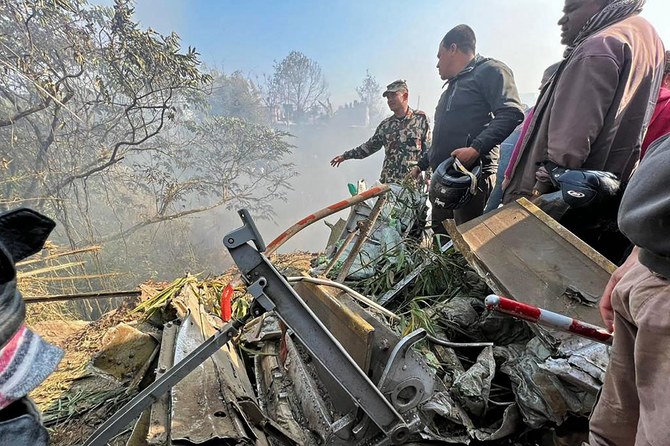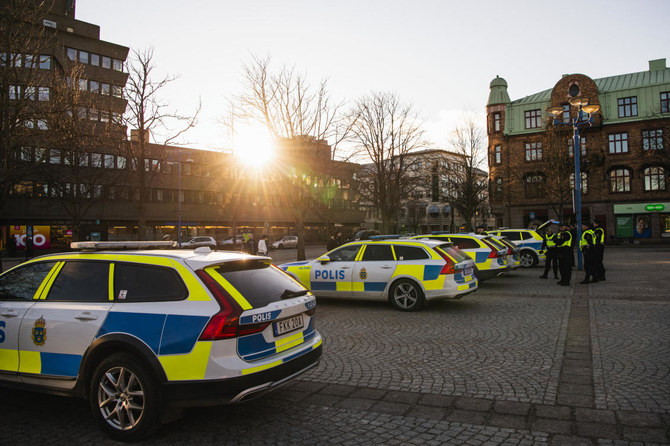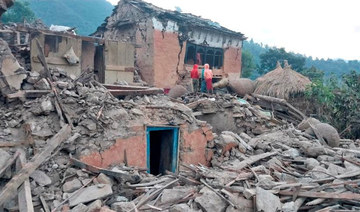POKHARA, Nepal: A plane making a 27-minute flight to a Nepal tourist town crashed into a gorge Sunday while attempting to land at a newly opened airport, killing at least 68 of the 72 people. At least one witness reported hearing cries for help from the fiery wreck. It’s the country’s deadliest airplane accident in three decades.
Hours after dark, scores of onlookers crowded around the crash site near the airport in the resort town of Pokhara as rescue workers combed the wreckage on the edge of the cliff and in the ravine below. Officials suspended the search for the four missing people overnight and planned to resume looking Monday.
Local resident Bishnu Tiwari, who rushed to the crash site near the Seti River to help search for bodies, said the rescue efforts were hampered by thick smoke and a raging fire.
“The flames were so hot that we couldn’t go near the wreckage. I heard a man crying for help, but because of the flames and smoke we couldn’t help him,” Tiwari said.
It was not immediately clear what caused the accident, Nepal’s Civil Aviation Authority said.
A witness said he saw the aircraft spinning violently in the air after it began landing, watching from the terrace of his house. Finally, Gaurav Gurung said, the plane fell nose-first toward its left and crashed into the gorge.
The aviation authority said the aircraft last made contact with the airport from near Seti Gorge at 10:50 a.m. before crashing.
The twin-engine ATR 72 aircraft, operated by Nepal’s Yeti Airlines, was flying from the capital, Katmandu, to Pokhara, located 200 kilometers (125 miles) west. It was carrying 68 passengers including 15 foreign nationals, as well as four crew members, Nepal’s Civil Aviation Authority said in a statement. The foreigners included five Indians, four Russians, two South Koreans, and one each from Ireland, Australia, Argentina and France.
Images and videos shared on Twitter showed plumes of smoke billowing from the crash site, about 1.6 kilometers (nearly a mile) away from Pokhara International Airport. The aircraft’s fuselage was split into multiple parts that were scattered down the gorge.
Firefighters carried bodies, some burned beyond recognition, to hospitals where grief-stricken relatives had assembled. At Katmandu airport, family members appeared distraught as they were escorted in and at times exchanged heated words with officials as they waited for information.
Tek Bahadur K. C., a senior administrative officer in the Kaski district, said he expected rescue workers to find more bodies at the bottom of the gorge.
Images and videos shared on Twitter showed plumes of smoke billowing from the crash site as rescue workers, Nepali soldiers, and crowds of people gathered around the wreckage of the aircraft to find survivors. The aircraft’s fuselage was split into multiple parts that were scattered down the gorge.
Prime Minister Pushpa Kamal Dahal, who rushed to Tribhuvan International Airport in Katmandu after the crash, set up a panel to investigate the accident.
”The incident was tragic. The full force of the Nepali army, police has been deployed for rescue,” he said.
South Korea’s Foreign Ministry said in a statement that it’s still trying to confirm the fate of two South Korean passengers and has sent staff to the scene. The Russian Ambassador to Nepal, Alexei Novikov, confirmed the death of four Russian citizens who were on board the plane.
Pokhara is the gateway to the Annapurna Circuit, a popular hiking trail in the Himalayas. The city’s new international airport began operations only two weeks ago.
The type of plane involved, the ATR 72, has been used by airlines around the world for short regional flights. Introduced in the late 1980s by a French and Italian partnership, the aircraft model has been involved in several deadly accidents over the years.
In Taiwan two earlier accidents involving ATR 72-500 and ATR 72-600 aircrafts happened just months apart.
In July 2014, a TransAsia ATR 72-500 flight crashed while trying to land on the scenic Penghu archipelago between Taiwan and China, killing 48 people onboard. An ATR 72-600 operated by the same Taiwanese airline crashed shortly after takeoff in Taipei in February 2015 after one of its engines failed and the second was shut down, apparently by mistake.
The 2015 crash, captured in dramatic footage that showed the plane striking a taxi as it hurtled out of control, killed 43, and prompted authorities to ground all Taiwanese-registered ATR 72s for some time. TransAsia ceased all flights in 2016 and later went out of business.
ATR identified the plane involved in Sunday’s crash as an ATR 72-500 in a tweet. According to plane tracking data from flightradar24.com, the aircraft was 15 years old and “equipped with an old transponder with unreliable data.” It was previously flown by India’s Kingfisher Airlines and Thailand’s Nok Air before Yeti took it over in 2019, according to records on Airfleets.net.
Yeti Airlines has a fleet of six ATR72-500 planes, company spokesperson Sudarshan Bartaula said.
Nepal, home to eight of the world’s 14 highest mountains, including Mount Everest, has a history of air crashes. According to the Flight Safety Foundation’s Aviation Safety database, there have been 42 fatal plane crashes in Nepal since 1946.
Sunday’s crash is Nepal’s deadliest since 1992, when all 167 people aboard a Pakistan International Airlines plane were killed when it plowed into a hill as it tried to land in Katmandu.
The European Union has banned airlines from Nepal from flying into the 27-nation bloc since 2013, citing weak safety standards. In 2017, the International Civil Aviation Organization cited improvements in Nepal’s aviation sector, but the EU continues to demand administrative reforms.
68 dead, 4 missing after Nepal’s worst air crash in 30 years
https://arab.news/j3bu8
68 dead, 4 missing after Nepal’s worst air crash in 30 years

- A witness said he saw the aircraft spinning violently in the air after it began landing, watching from the terrace of his house
- The twin-engine ATR 72 aircraft, operated by Nepal’s Yeti Airlines, was flying from the capital, Katmandu, to Pokhara
Muslim professionals quit ‘hostile’ France in silent brain drain

“I feel much better here than in France,” the 32-year-old of North African descent told AFP.
“We’re all equal. You can have a boss who’s Indian, Arab or a French person,” he said.
“My religion is more accepted.”
Highly-qualified French citizens from Muslim backgrounds, often the children of immigrants, are leaving France in a quiet brain drain, seeking a new start abroad in cities like London, New York, Montreal or Dubai, according to a new study.
The authors of “France, you love it but you leave it”, published last month, said it was difficult to estimate exactly how many.
But they found that 71 percent of more than 1,000 people who responded to their survey circulated online had left in part because of racism and discrimination.
Adam, who asked that his surname not be used, told AFP his new job in the United Arab Emirates has given him fresh perspective.
In France “you need to work twice as hard when you come from certain minorities”, he said.
He said he was “extremely grateful” for his French education and missed his friends, family and the rich cultural life of the country where he grew up.
But he said he was glad to have quit its “Islamophobia” and “systemic racism” that meant he was stopped by police for no reason.
France has long been a country of immigration, including from its former colonies in North and West Africa.
But today the descendants of Muslim immigrants who came to France seeking a better future say they have been living in an increasingly hostile environment, especially after the attacks in Paris in 2015 that killed 130 people.
They say France’s particular form of secularism, which bans all religious symbols in public schools including headscarves and long robes, seems to disproportionately focus on the attire of Muslim women.
Another French Muslim, a 33-year-old tech employee of Moroccan descent, told AFP he and his pregnant wife were planning to emigrate to “a more peaceful society” in southeast Asia.
He said he would miss France’s “sublime” cuisine and the queues outside the bakeries.
But “we’re suffocating in France”, said the business school graduate with a five-figure monthly salary.
He described wanting to leave “this ambient gloom”, in which television news channels seem to target all Muslims as scapegoats.
The tech employee, who moved to Paris after growing up in its lower-income suburbs, said he has been living in the same block of flats for two years.
“But still they ask me what I’m doing inside my building,” he said.
“It’s so humiliating.”
“This constant humiliation is even more frustrating as I contribute very honestly to this society as someone with a high income who pays a lot of taxes,” he added.
A 1978 French law bans collecting data on a person’s race, ethnicity or religion, which makes it difficult to have broad statistics on discrimination.
But a young person “perceived as black or Arab” is 20 times more likely to face an identity check than the rest of the population, France’s rights ombudsman found in 2017.
The Observatory for Inequalities says that racism is on the decline in France, with 60 percent of French people declaring they are “not at all racist”.
But still, it adds, a job candidate with a French name has a 50 percent better chance of being called by an employer than one with a North African one.
A third professional, a 30-year-old Franco-Algerian with two masters degrees from top schools, told AFP he was leaving in June for a job in Dubai because France had become “complicated”.
The investment banker, the son of an Algerian cleaner who grew up within Paris, said he enjoyed his job, but he was starting to feel he had hit a “glass ceiling”
He also said he had felt French politics shift to the right in recent years.
“The atmosphere in France has really deteriorated,” he said, alluding to some pundits equating all people of his background to extremists or troublemakers from housing estates.
“Muslims are clearly second-class citizens,” he said.
Adam, the consultant, said more privileged French Muslims emigrating was just the “tiny visible part of the iceberg”.
“When we see France today, we’re broken,” he said.
North Korea fires ballistic missile, South Korea’s military says

- South Korea’s Joint Chiefs of Staff did not immediately provide details of the projectile or its trajectory
- North Korea has launched a range of ballistic and cruise missiles as well as tactical rockets in recent months
SEOUL: North Korea fired a ballistic missile toward the sea off its east coast, South Korea’s military said on Friday.
South Korea’s Joint Chiefs of Staff did not immediately provide details of the projectile or its trajectory.
North Korea has launched a range of ballistic and cruise missiles as well as tactical rockets in recent months, describing them as part of a program to upgrade its defensive capabilities.
Earlier on Friday, the powerful sister of North Korea leader Kim Jong Un said its tactical rockets were intended solely as a deterrent against South Korean military aggression, while denying that Pyongyang was exporting the weapons.
The missile launch comes at the same time as a visit by Russian President Vladimir Putin to the Chinese northeastern city of Harbin.
French police ‘neutralized’ armed person who tried to set fire to synagogue in Rouen — Darmanin

- The incident occurred early on Friday morning
PARIS: French police officers in Rouen ‘neutralized’ an armed individual who was intent on setting fire to the town’s synagogue, Interior Minister Gerald Darmanin said on Friday.
The incident occurred early on Friday morning, Darmanin said in a post on social network X.
Regional French broadcaster France 3 said fire fighters were on the site.
Rouen mayor said in a post the Normandy town was ‘battered and shocked’.
Against the backdrop of tensions in Middle East and Israel’s ground offensive in the Gaza strip, France recently raised its alert level to the highest level.
Suspected gunshots near Israeli embassy in Stockholm prompt police cordon

STOCKHOLM: Swedish police have detained several people and cordoned off an area in Stockholm after a patrol heard suspected gunshots, they said on Friday, with the Israeli embassy located in the closed-off area.
"A police patrol at Strandvagen in Stockholm heard bangs and suspected there had been a shooting," police said on their website, adding that the affected area lay between the capital's Djurgarden Bridge, its Nobel Park and the Oscar Church.
Several people have been detained and an investigation has been launched into a suspected serious weapons crime, they added.
"In connection with the ongoing forensic investigation, findings have been made that strengthen the suspicions that a shooting took place," police said on its website.
Reuters could not immediately reach police and the Israeli embassy for comment.
Swedish news agency TT said police declined to comment on whether there was a link between the incident and the Israeli embassy.
‘Hindu nation’: Religion trumps caste in India vote

- Modi’s strategy of appealing to pan-Hindu unity has reaped political dividends
- Modi government accused of marginalizing country’s 200-million-plus Muslims
AGRA, India: Born at the bottom of the Hindu faith’s rigid caste system, voters like Anil Sonkar will determine whether Indian Prime Minister Narendra Modi returns to power next month.
More than two-thirds of India’s 1.4 billion people are estimated to be on the lower rungs of a millennia-old social hierarchy that divides Hindus by function and social standing.
Politicians of all stripes have courted lower caste Indians with affirmative action programs, job guarantees and special subsidies to mitigate long-standing discrimination and disadvantage.
But Modi’s Hindu-nationalist Bharatiya Janata Party (BJP) has established itself as India’s dominant political force with a different pitch: think of your religion first, and caste second.
“There are no economic opportunities and business has never been so bad for me,” said Sonkar, a 55-year-old fishmonger and a member of the Dalit castes, once disparagingly known as “untouchables.”
“But under this government, we feel safe and proud as Hindus,” he told AFP in the tourist city of Agra, home of the Taj Mahal. “That is why, despite everything, I voted for Modi.”
Modi’s party is expected to easily win this year’s national election once it concludes in June, in large part due to his government’s positioning of the Hindu faith at the center of its politics.
His government has been accused in turn of marginalizing the country’s 200-million-plus Muslims, leaving many among them fearful for their futures in India.
But its strategy of appealing to pan-Hindu unity, and directing the faith’s internal frictions outwards, has reaped political dividends.
“The BJP’s base among the marginalized has grown over every election since 2014,” political scientist and author Sudha Pai told AFP.
The party, she added, had successfully forged a new pan-Hindu political coalition by showing respect to the “cultural symbols, icons and history” of low-caste voters, and in the process furthering its goal of building a “Hindu nation.”
Caste remains a crucial determinant of one’s station in life at birth, with higher castes the beneficiaries of ingrained cultural privileges, lower castes suffering entrenched discrimination, and a rigid divide between both.
Modi himself belongs to a low caste, but the elite worlds of politics, business and culture are largely dominated by high-caste Indians.
Less than six percent of Indians married outside their caste, according to the country’s most recent census in 2011.
Modi’s political coalition has managed to bridge this internal divide by trumpeting a vision of a resurgent and assertive Hindu faith.
The prime minister began the year by inaugurating a grand temple to the Hindu deity Ram, built on the site of a centuries-old mosque razed by Hindu zealots decades earlier.
Construction of the temple fulfilled a long-standing demand of Hindu activists and was widely celebrated by Hindu voters, whatever their caste group.
Modi’s rise also coincided with the declining fortunes of caste-based political parties that had dominated politics for decades in Uttar Pradesh, India’s most populous state with more people than Nigeria and its most important electoral battleground.
Many in the state accused these parties of directing welfare programs and other benefits of political power to their own caste groups, a situation they say changed when Modi came to power and made them available for all disadvantaged voters.
“The soles of my slippers wore off as I ran around trying to get a card for free rations,” homemaker Munni Devi, 62, told AFP at a BJP campaign rally over the din of frenzied drum beats and music.
“But Modi gave me one immediately after coming to power,” she told AFP.
The BJP has been able to unite a broad array of caste groups into a single bloc of support, but caste discrimination remains a fact of life both in politics and society at large.
Despite Modi’s own low-caste origins, the senior ranks of his ministry, party and civil service remain overwhelmingly dominated by upper-caste functionaries.
“Our lawmaker is from our caste and from the BJP,” said farmer Patiram Kushwaha, a Modi supporter reconsidering his allegiance.
“He cannot do anything for us because those sitting at the top don’t listen to him.”
More than two dozen opposition parties in this year’s poll have campaigned on a joint pledge to address the structural causes of discrimination by staging a caste-based national census and redirecting resources to the most disadvantaged.
Analysts nonetheless expect Modi to triumph convincingly over the opposition bloc, but Neelanjan Sircar, of the Center for Policy Research think-tank in New Delhi, said the BJP faced a monumental challenge in holding its coalition together over the long term.
“This balancing act of keeping together groups which don’t really get along with each other is extremely tough in the long run,” he told AFP. “At some point, you have to face the demons of those contradictions.”


















